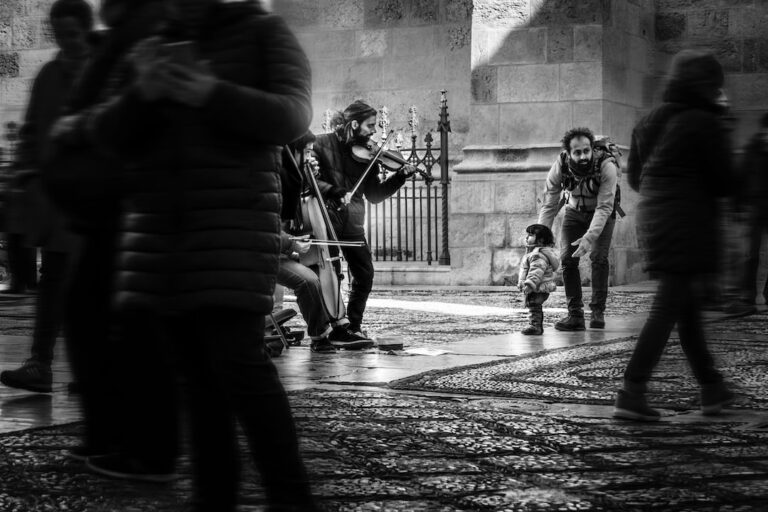
A man performed complex and difficult works by Bach, Schubert and Massanet 45 minutes ago in January in Washington, DC.
A middle-aged man notices the violinist about three minutes after he starts playing. He then slows down and, after a few seconds he resumes his journey quickly to catch up to where he needs to be.
A woman quickly passes the violinist by throwing the money in the bowl without interrupting her walking. One minute after the tip, the violinist gets his $1 first tip. Another man stops and squints at the violinist a few minutes later. But, he quickly resumes the conversation even though he looks at his watch.
Over the course of his 45-minute performance, approximately a thousand people pass by the violinist, many of whom are in a rush to get to work. Six people are able to stand for a brief moment in front of the violinist. 20 people donate money by walking without stopping.
While playing, the violinist earns $32. He is only known by one person after he stops playing. Joshua Bell is the greatest violinist in the entire world He gave 20 dollars instead of 32 dollars. Joshua Bell was playing the most complicated works ever written during this time. He also had a $3.5million violin in his hand. Two days before his Boston mini-concert, his tickets went on sale for an average of $100.
Perception, enjoyment, priorities…
Washington Post published a fictionalized version of Joshua Bell playing the violin on the subway wearing a baseball hat as part of its social experiment on perception, enjoyment, priorities. The question is: Is beauty possible in an ordinary setting at an inappropriate time? Are we able to stop enjoying it? Can we spot a talent in an unorthodox setting?
The results are known.
Stopping and slowing down is something many people consider a “luxury”, but stopping is an unacceptable choice. It is important to slow down and notice the details. The paradox is that many of us don’t have the time or patience to slow down.
But, this is only a need. Healthy and fun life…
We tend to focus more on the negative. Events and experiences that result from our traumatic experience The evolution of survival mechanisms, social-family pressure and experiences. We need to train our minds to see the positives.
We all seek “pleasure” because we all are. We are all after pleasure. Entertainment, eating and drinking, as well as smoking, alcohol, and other beverages. Social media, etc. These short-term pleasures come at a cost.
Happiness is found in the details
Yoga and meditation, on the other hand, teach us to notice the details in our environment and ourselves, rather than the hedonistic pleasures of alcohol, cigarettes, sex and food. Social media addiction, etc.)
An article published in 2018 that was compiled from scientific studies on the effects mindfulness-based approaches have on alcohol, tobacco, and substance addiction. It was decided that Mindfulness could help reduce substance abuse behavior by activating the “cognitive controls networks” in our brains.This will allow for more regulation of the reaction of reaching for the substance. This is a sign of how we can change certain automatic behaviors with an “awareness” perspective. Meditation and yoga are also known to provide more benefits. Awareness of inner and outer space By strengthening the proprioceptive, interceptive, and proprioceptive sensations.
It’s a fact, too. more details bring more happiness. He is a wine expert who can spot the different aromas in different wines. enjoys some tastes more… People who are able to find different tastes in life enjoy life more.
You first need to have Take your time It is possible.
The universe has offered us many opportunities this year to slow down, slow down and turn inward. These days, we Use your time At home, let us focus on the inner resources we have that can transform, strengthen, and grow us rather than the hedonistic pleasures which harm us.